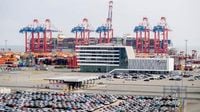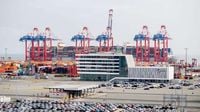The German automotive industry is bracing for significant upheaval following the announcement of new tariffs by U.S. President Donald Trump. Set to take effect on April 3, 2025, these tariffs will impose a hefty 25 percent duty on all cars and automotive parts imported into the United States, a move that industry leaders warn could have far-reaching economic consequences.
Hildegard Müller, President of the German Association of the Automotive Industry (VDA), described the tariffs as a "fatal signal for free and rules-based trade." She emphasized that these additional tariffs represent a considerable burden not only for companies but also for the interconnected global supply chains that underpin the automotive sector. "The consequences will cost growth and prosperity on all sides," Müller stated, highlighting the potential negative impact on consumers in both Europe and North America.
The U.S. has long been the most important market for German car manufacturers, accounting for 13.1 percent of new passenger car exports from Germany in 2024. Notably, nearly every third Porsche and every sixth BMW sold last year were purchased in North America. The proposed tariffs threaten to disrupt this lucrative market, with experts warning that the financial repercussions could be dire.
In 2024, German manufacturers produced over 844,000 vehicles in the U.S., with about half of those vehicles exported globally. The VDA reports that 86 percent of companies in the automotive sector anticipate that the U.S. tariffs will affect them adversely. Müller called for immediate negotiations between the U.S. and the EU to establish a bilateral agreement that could mitigate these impacts.
The tariffs are expected to exacerbate existing challenges within the German automotive industry, which is already facing a downturn. For instance, profits for major manufacturers have plummeted, with Volkswagen and Porsche reporting declines of around 30 percent, and BMW's profits dropping by 37 percent. The timing of these tariffs could not be worse for an industry already struggling to maintain its competitive edge.
The ZDK (German Federation for Motor Trades and Repairs) echoed Müller’s sentiments, criticizing the U.S. decision to impose special tariffs as a violation of the principles of rules-based trade. ZDK Vice President Thomas Peckruhn warned that the tariffs could trigger a trade conflict, stating that they pose a significant risk of a conflict spiral that would ultimately leave all parties worse off.
In response to the escalating trade tensions, EU Commission President Ursula von der Leyen has vowed to pursue dialogue with the U.S. to protect European economic interests. "As a major trading power and a strong community of 27 member states, we will collectively protect our workers, businesses, and consumers across the European Union," von der Leyen stated. She emphasized that tariffs are detrimental to both businesses and consumers in the U.S. and the EU alike.
German Economic Affairs Minister Robert Habeck urged the EU to respond decisively to the announced tariffs while avoiding a tariff spiral. "We must make it clear that we will not back down against the U.S. We need strength and confidence," he asserted, warning that the tariffs would ultimately harm both the U.S. and EU economies and disrupt global trade.
Foreign Minister Annalena Baerbock also criticized the proposed tariffs, cautioning against the global economic ramifications. She noted that while Europe does not desire a trade war, it is prepared to protect its industry and jobs. Baerbock stressed that negotiations are possible, but they must be based on respect and established rules.
The broader implications of these tariffs extend beyond just German manufacturers. Countries like Canada, South Korea, and Japan are also bracing for the impact, with their leaders expressing concerns about potential retaliatory measures. Canadian Prime Minister Mark Carney labeled the tariffs a "direct attack" on Canadian workers, while South Korean officials are developing emergency plans to mitigate the fallout.
Japanese Prime Minister Shigeru Ishiba announced that his country would take "appropriate" steps in response to the tariffs, given that automobiles made up 28.3 percent of Japan's total exports to the U.S. last year, the highest share of any goods. Meanwhile, the Chinese government has criticized the tariffs as a violation of World Trade Organization rules, arguing that no country can achieve prosperity through the imposition of additional tariffs.
As the situation develops, industry experts warn that the tariffs could lead to higher prices for consumers in the U.S. and reduced sales for manufacturers unable to absorb the costs. Stefan Bratzel from the Center of Automotive Management noted that the additional tariffs would be a "significant burden" for manufacturers, making many models unsalable in the U.S. market.
In light of these developments, the VDA continues to call for swift negotiations to avert a trade war that could have devastating effects on both sides of the Atlantic. The stakes are high, and the automotive industry is watching closely as the clock ticks down to the implementation of these new tariffs.
With the potential for a trade conflict looming, all eyes are on the negotiations that could shape the future of transatlantic trade relations. The outcome will not only affect the automotive industry but could also set the tone for international trade policy in the coming years.









